Ah I get what you're saying. I thought you're talking from a sphere master's perspective.No I was saying that your industry will die if you get sphered by the US or France because your industry can't possibly compete. I've experienced it as Sweden: moment you get sphered by GB your steel industry starts dying.
The Republic - A Central American AAR
- Thread starter MondoPotato
- Start date
-
We have updated our Community Code of Conduct. Please read through the new rules for the forum that are an integral part of Paradox Interactive’s User Agreement.
You are using an out of date browser. It may not display this or other websites correctly.
You should upgrade or use an alternative browser.
You should upgrade or use an alternative browser.
I'm not 100% sure if there is a trigger that changes it over the Berlin or not,
I'm sure it'll remain Vienna. Why would there be an Austrian-dominated Germany with a capital in Berlin, right?
Great overview of the consequences of the War!
Thanks! I think the chapter turned out alright.
Great news! Until someone spheres Brazil again, probably USA?
Actually that's not really to much of a concern. The crisis will only happen again if another major coffee produced with a high population spheres them. Not many nations fit the bill right now, except for France. A sphere with the USA wouldn't be too bad for me, but if France gets involved the industry will collapse again.
Bad thing, being on the losing side of a great war. Be interesting now to see how Germany progresses with that much territory this early in it life. If WW2 rolls around, I guess she won't be having to worry about facing Britain or being blockaded.
I'm betting there's going to be some instability for four or five years, but once that settles Germany will be a powerhouse. They're super industrialized and have a ton of soldiers. Germany won't have to worry about England blockading them, but the Allies might have to worry more about England joining Germany!
Or France
the answer is obvious here: get sphered by France or USA
(actually don't do that your industry will die)
I guess I kinda answered this question already, but yeah, sphered by France will be economic death. I've been in the US sphere for long enough to tailor my industry to their needs, so my economy has been fine. The AI doesn't seem to have the same abilities though, unfortunately.
I'm sure it'll remain Vienna. Why would there be an Austrian-dominated Germany with a capital in Berlin, right?
That makes sense to me! I think a Germany centred around Vienna is pretty cool anyway.
They guarantee your independence and they have prioritized access to your markets.
But you don't get Tarrifs of what they buy. Countries dependant of exports are lucky if don't broke if sphered - believe me, almost all the games that I was sphered I needed to overise taxes and and overlow maintenance and salaries to don't broke....They guarantee your independence and they have prioritized access to your markets.
Not much. The Great Powers are very unfair. What Merrick said though, they can protect you against a nation that is more closer and dangerous to you. As Mexico, I would rather have Britain as the sphere master to protect me against USA.This is awesome. What are the advantages of being sphered by a Great Power ?
Great stuff as always, and so its seems Foch's 20 year prediction is pretty optimistic in this timeline!
More?
More?
I am still holding my breath for the climactic ending...
Me too! Hopefully you'll get to read it soon!
Superbly good! Best AAR on the whole PDS forum, by far!
Thank you very much! I don't know about best, considering how many other great AAR's are going right now, but I think it's turning out pretty good so far.
Great stuff as always, and so its seems Foch's 20 year prediction is pretty optimistic in this timeline!
More?
More is coming soon. I've got the next post pretty much there... I've just been sidetracked recently, and I want to make sure it's ready properly and not rushed. It seems much harder to write now that we're at the end!
I leave for a few months and all this happens  Awesome updates! Please give Greece all her demands :happy:
Awesome updates! Please give Greece all her demands :happy:
It seems much harder to write now that we're at the end!
Ah, well you see that's a problem I've never had to deal with.
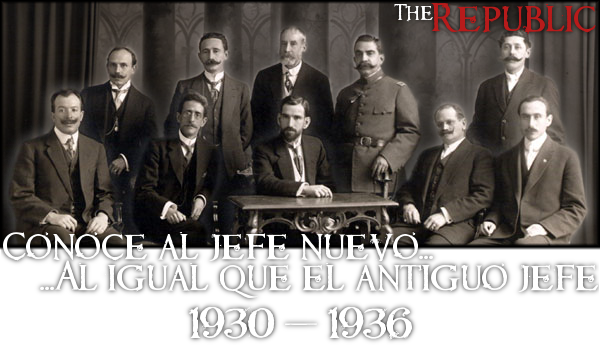
It was subtle at first. Few noticed the changes. Most welcomed them.
When President Ponciano Rosales returned from France after signing the Treaty of Versailles, he arrived to tremendous fanfare. A conquering hero, Rosales was praised for his leadership during the war. He was a very active participant in the command of the armies. In his absence in congress, the charismatic Socialista leader Aniceto Arbenz-Jimenez took a very active role in the civil leadership of the nation. Never stepping outside of his bounds as official opposition, he even went as far as to pledge unyielding support to the President and the Liberals. "A war was no time for partisan politics", he would often remark, "Now is a time when all Centroamericano's must stand together."
Aniceto's image of the selfless socialist was so strongly embedded in the psyche of the people. He was free with his wealth, honest with his words, and every action he took was for the people. His reputation grew far beyond that of a politician. Aniceto was a rock-star, and the Republic was his stage. And by God, could he put on a performance.
During the war, Aniceto petitioned the senate to halt the elections of 1927. He was a very likely winner, with his popularity at an all time high. But Aniceto insisted that the minds of the people must be on the war, and Ponciano was the leader the nation needed now. When the senate refused to even hold a vote among the deputies on the Socialista leaders request on such a breach of democratic process, Aniceto embarked on a major political campaign against his own party, urging the voting public to support their triumphant leader, Ponciano Rosales, and the Liberal party.
The move distanced him from his Socialista deputies, who felt the move was reckless and pointless. The party needed to seize power well it could, his advisors insisted. Aniceto was adamant in his stance.
In the end, Ponciano handedly won a second term, and a strong majority government. But the real winner of the election was Aniceto. After the election, Aniceto, and the Socialista party, saw an upswing in popularity that went beyond just the Centroamericano population, bringing even the rebellious Haitians, the Colombians, and the Cubans into the political fold. "Ponciano was the President of the Republic, but Aniceto was her Spirit" people would proclaim.
But when Aniceto was not standing on the stage of politics, and performing for his adoring fans, he was most at home running his massive corporate empire, the Arbenz-Jimenez Group. Prior to the war, Aniceto owned all of the nations Iron mines and steelworks. When the Plantation Act was repealed and the United Fruit Company lost total control of the fruit plantations, Aniceto was quick to step in and purchase millions of Real's worth of unused fallow land. As rail-lines, factories, and ports were nationalized and assets redistributed to Centroamericano corporations, Aniceto was one of the largest purchasers, taking control of the rubber production in San Miguel, electric companies in Nicaragua, Costa Rica and Panama, and the burgeoning fabrications plants in Cuba. He became a part owner of the Republic's textiles giant, the Empresa Algodonera Liberto company. He created the nations first nation-spanning phone company, taking near total control of the Republics lines of communication. He had even purchased the nations largest newspaper.
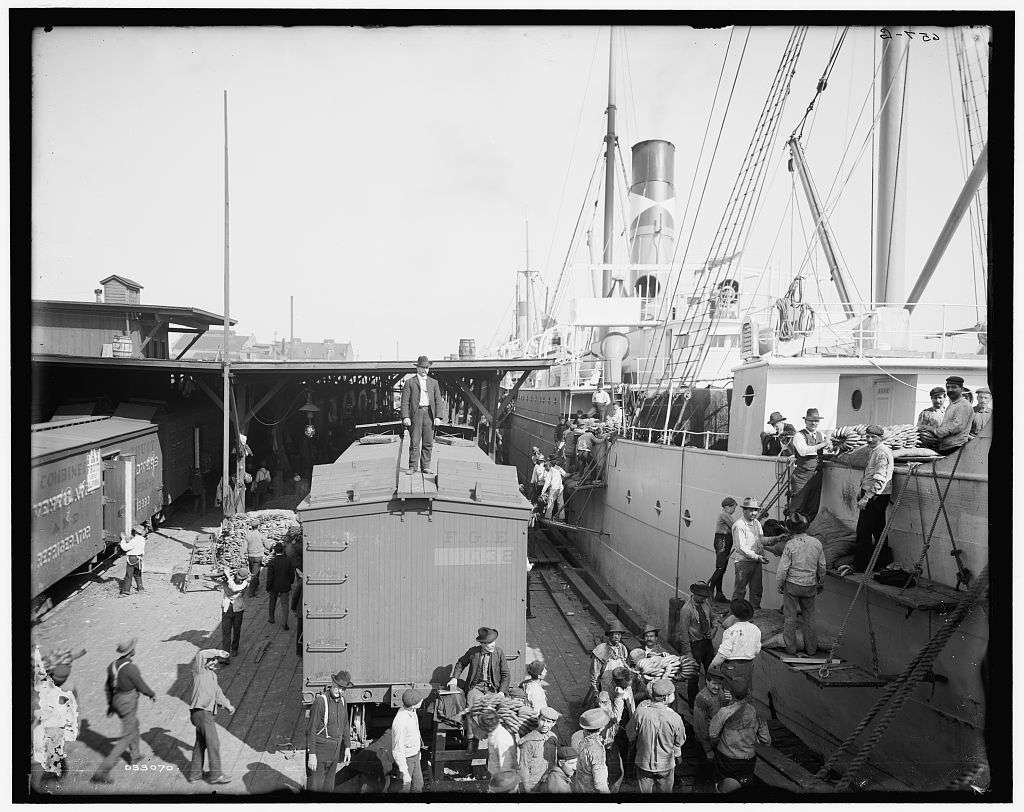
1929, A United Fruit Company transport loads a shipment of banana's, the only major product they control in the Republic.
As kind as the Great War was to Aniceto's political career, it was even kinder to his pocketbook. When the war began, demand for his metalwork's produce grew, and the Nation was happy to pay top-dollar. His personal profits soared, allowing him to invest in the nations first major automobile factories and fuel refineries. He even took what was seen as a major gamble, investing in airplane production with the intention of exporting to the United States. For the needs of the war effort, he established armouries in Guatemala and Haiti, enabling the Republic to becoming entirely self-sufficient in the production of ammunition and weaponry needed for.
When the war ended, new territory opened the doors for new business opportunities. British companies were displaced, and Centroamerican corporations moved in like flocks of hungry vultures. Aniceto was quick to purchase cotton plantations in the Caribbean, and lay claim to vast quantities of land in the new state of Zulia, where oil prospecting was showing positive results. His personal wealth nearly doubled between the end of the war and 1930.
Aniceto and his collection of companies grew to equal and rival the dominance of the United Fruit Company in the economic sphere. His personal wealth matched that of the richest men in Europe and the United States. His personal income was greater than the GDP of some nations. His dominance in the industrial sector of the Republic was so strong, he could shut down the nation should he so desire. Few Centroamericano's had any idea of the strength and distance of his reach, and just how powerful their new political messiah truly was.
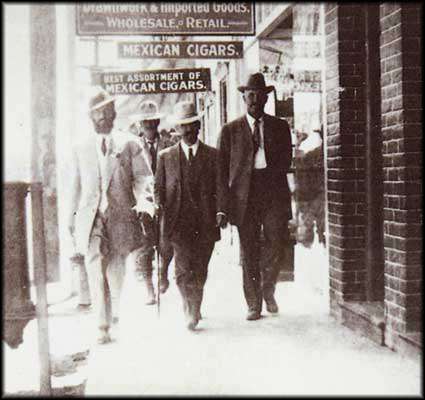
Aniceto Arbenz-Jimenez and several business associates on the streets of Kingston, Jamaica, negotiating the purchase of the islands sulphur mines
For the Centroamericano people, however, Aniceto had no issue spreading his tremendous wealth around. He established private schools, built hospitals, and created the nations largest Workers Union, granting his hundreds of thousands of employees benefits the state was unable to and, as he claimed, the Liberals were unwilling to.
When the President returned, Aniceto once again became the face of the official opposition. His unyielding support of the President changed to political adversity. The war-weary President was ill prepared to return to the onslaught. His power and popularity hinged strongly on the success of the war, and his leadership during the war. With the war over, his purpose was fulfilled, and many saw him as little more than a lame-duck president merely keeping the seat warm before Aniceto would finally take his place at the nations helm.
Much of President Rosales time was taken up by the inauguration of new states and the political restructuring of the post-war Republic.
The end of the war brought with it seven new fully recognized states in the Federation, and a colonial territory controlled by the federal government directly, and the President was required to oversea their inclusion and initial elections.
While Ponciano Rosales was preoccupied, splinter groups and underground movements took advantage of his political weakness and took to the streets in marches.
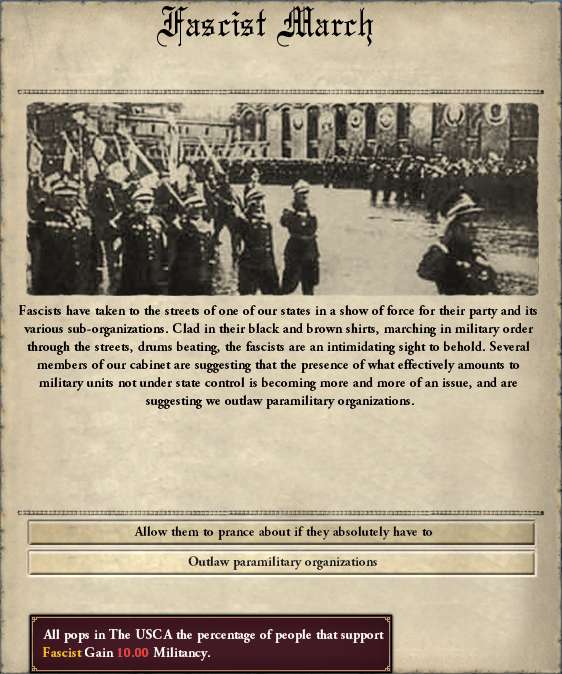
The growing Fascist movements, lead primarily by the Americano party, were of most immediate concern. While the party was still outside of power in the core territories, they had tremendous support in New Granada. The Americano supporters in New Grenada were outraged by the Liberal Presidents lobbying to have a greater representation of the local Andean population in both the Senate and the among the Deputies. They were upset that land distributions were granted equally, regardless of nationality. The Americano party urged the President to give rights to land and industry first to 'native' Centroamericano's who made up the vast majority of the Republics educated and wealthy elite.
Previous Presidents, Ponciano included, had paid little attention to the military marches of the nations only Fascist party. However, as news came pouring in from Europe ofFascist government overthrows in Austria and open rebellions in Italy, the President grew concerned. He saw the Fascists as a threat that required elimination. Though the constitution prevented him from outright banning the Americano party, it wouldn't prevent him from restricting their small, but very vocal and very militaristic membership.
Restrictions were minor but decisive. Americano members were overlooked entirely during the land distributions after the takeover of Venezuelan Zulia and the Caribbean islands. They were overlooked during legal appointments. Their senators were totally ignored in congress. The louder the Americano party was, the more the President would ignore them. He had hoped their membership was too small to pose a real threat. In a final act, after witnessing a major march of the Americano parties supporters, he outlawed their military styled marches entirely. He had them declared an illegal military organization, and brought the Republican Army forward to prevent any further marches. The Americano's mobilized in New Grenada. Armed with rifles and in full military styled regalia, they marched brazenly in defiance of the Presidents ban. The Americano party headquarters in San Salvador denied all relation to this rebellious factions.
In the last major open revolt the Republic would experience over the next decade, Ponciano would march with the army personally to deal with the Americano rebellion. The military response by President Ponciano was intended to be quick, brutal, and send a strong message. The message was certainly received.
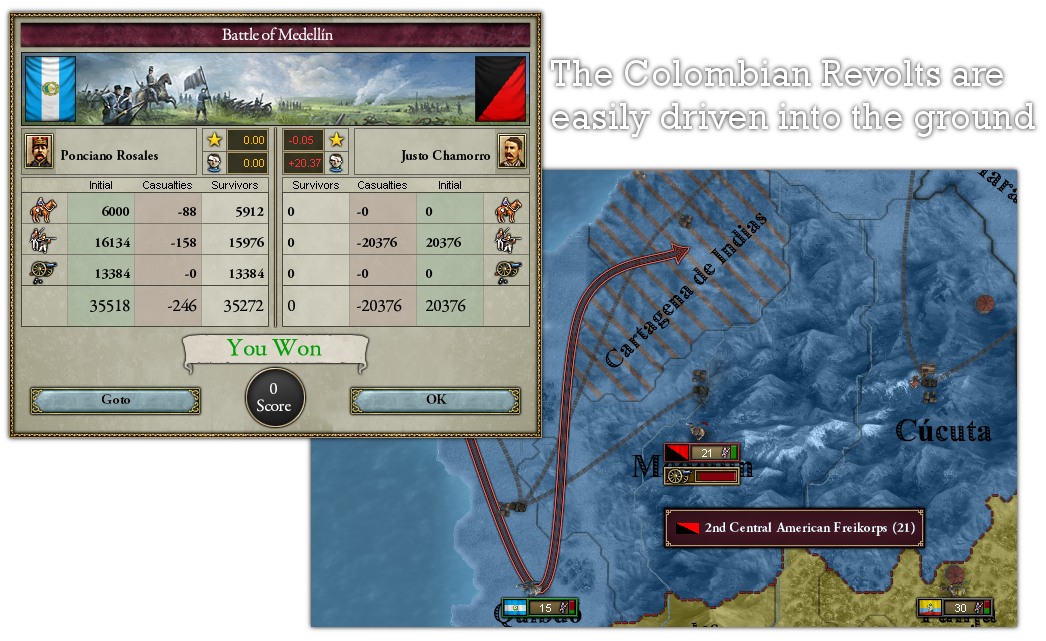
Instead of using local police and militia forces, as would have been expected, President Rosales mobilized the elite Republican Guard. In addition to thousands of infantry, the Ejercito Federal included powerful batteries of mobile artillery, and the legendary Guatemalan Dragoons. Not only did the Presidential response outnumber the Fascist army, it outclassed them in every category. The President ordered a full assault. No prisoners, and no mercy.
Though the action caused many of the underground movements to reel back and reconsider their plans, legal or not, the action was seen as totally and unnecessarily brutal by much of the population. Unfortunately for the Liberal party, the raid against the Fascists would come barely two weeks before the beginning of the next presidential elections.
For many, the campaigning through 1930 and into the early days of 1931 was seen as largely ceremonial, and a battle for official opposition rather than a battle for the presidency. The people were showing overwhelming support for Aniceto. Nevertheless, Aniceto would produce a strong and active campaign. He ignored Liberal and Conservador strongholds in Guatemala, El Salvador and Honduras, and put tremendous focus on the newly acquired territories.
Much of his campaign focused on the social needs of the people; needs that he could fulfill given the political powers to do so. His opponents argued Aniceto's personal powers and economic control were far to vast to also trust him with power in government. The arguments were compelling for many, which showed in many advance polls. Aniceto still held his dominant rock-star status, but those that were on the fence began to fear his power, and leaned towards Liberal and Conservador politics. Though Aniceto gave the people no reason to fear any political abuses, the Republic was well aware of the corrupting power wealth combined with the Presidency could bring.
The first taste of the threat Aniceto could represent came from Cuba. In an unadvised and dangerous show of support for the Socialista leader, several factories owned by the few companies Aniceto didn't directly own began strike marches, refusing to work unless the local populations promised support for the Socialista.
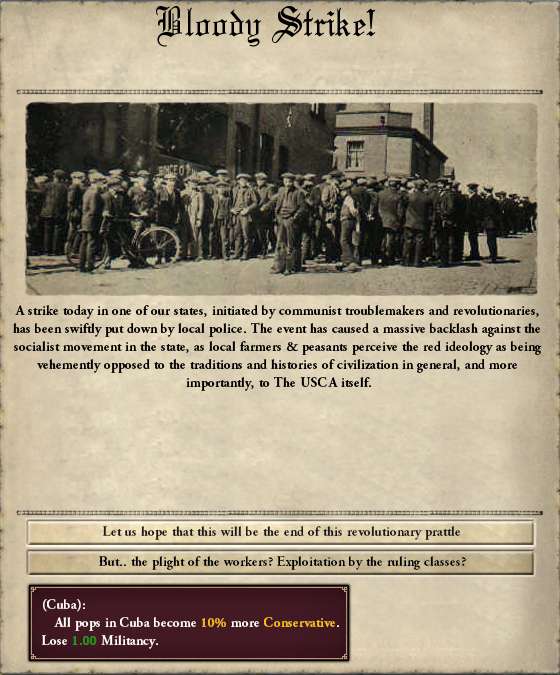
Though the real effect of the support-strikes was limited, what it represented was startling to many people. Aniceto had total control of the working class majority, and for those that he didn't control, he had the hearts, souls and will.
The Senate grew nervous, and began drafting rare pre-election legislation. To prevent conflicts of interest of a President during his term in office, he would have to give up control of his corporate entities to a board, or remove himself from the running. Before the law had even passed through the Senate and the Chamber of Deputies, Aniceto eagerly proclaimed his total support for such a wise, democratic and political action. He began making preparations for the management of his empire, should he be selected as the Republics next President.
By the spring, voting was taking place, first in the Caribbean islands, then on the mainland. The results were surprising, but not unexpected.
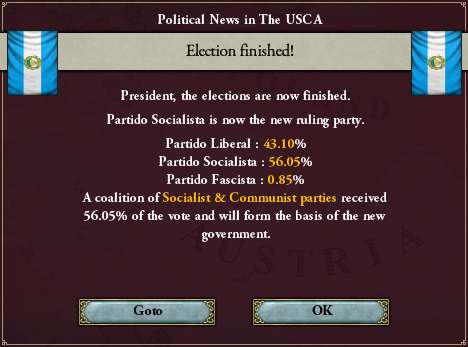
Aniceto Arbenz-Jimenez was elected, and his Socialista party had a strong majority within the Chamber of Deputies. Following behind him was, as expected, the Socialista's old allies, the Liberal party. But the election didn't come without it's share of concerns.
voting fraud
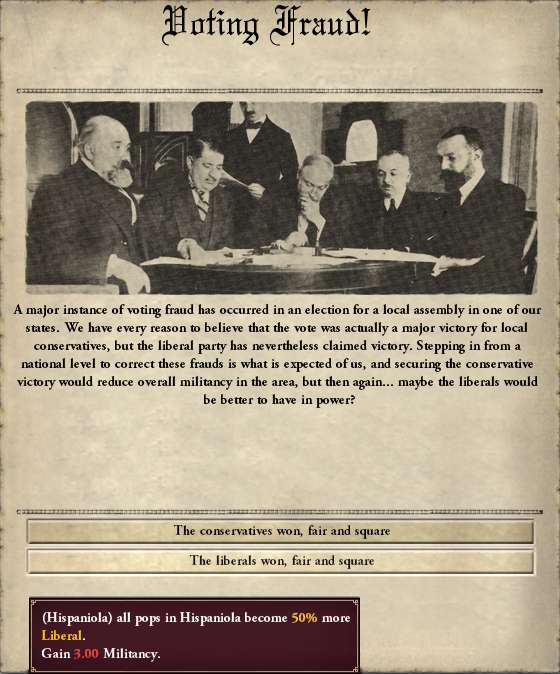
Many reports of voting fraud slowly came to light during the follow-up elections for the Senate. Many senators refused to acknowledge the reports, calling them outright lies, designed to paint the senate in a bad light. They demanded an immediate halt to the ridiculous accusations.
Though no signs of fraudulent activity could be pinned on the defiant Socialista win, scandals erupted in several states over mis-counts and outright vote purchasing between Conservador and Liberal Senatorial elections. The new President expressed his outrage and disgust at the Senate for being so concerned over his party's and his personal convictions to democracy, yet so willing to turn a blind eye to their own. In a rare move by any President, he even went to press, calling the Central American Senate a "Corrupt, self-serving organization that exists only for the old, rich aristocracy to feel some importance in a world that has long passed them by, and questions their real usefulness." He very publicly pointed out many of the Senators, even some from among his own party, that he had suspected of corruption. He ordered a complete recount, banning the affected senators from sitting in congress, and full investigations into the use of government funds by senators for personal expenses.
Many suspected the Presidents defiant actions, which could easily turn the Senate entirely against him, was an act of revenge against the last-minute legislation that would see him temporarily lose direct control of his massive corporate empire. There was likely a great deal of truth to such statements.
Whether the Senate approved or not, the people had spoken, and Aniceto would form a new Socialista controlled government.
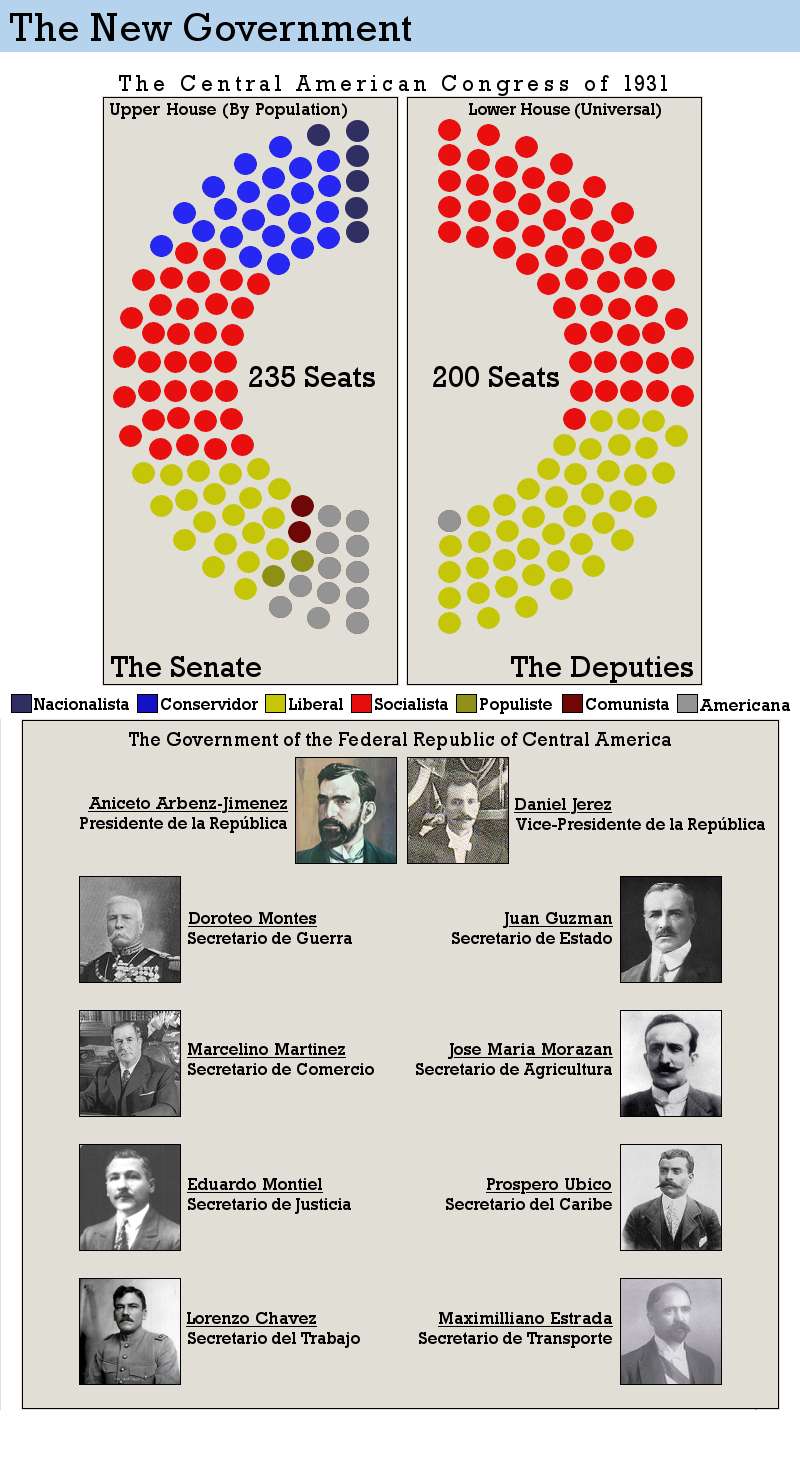
Aniceto's early years as president were productive and popular. The fear that Aniceto would use his combined personal and political power for nefarious purposes were quickly laid to rest. In addition to forcing major investigations into senatorial corruption, he eagerly drafted new reforms and social laws, pushing through nationally mandated, and nationally funded, unemployment subsidies and work day limits. In an early stage of Senatorial reform, he demanded the rebalancing of the Senate to a proportional representation system he personally designed. It was the first and the only system of it's kind in the world. The Senate was loathe to see reforms among their institution, but with strong public backlash against the Senate, they felt compelled to sign, if only to win back some support from the people.

Senatorial reforms would do little to win confidence, however. Aniceto continued his public campaign against the senate. Even the slightest shred of political corruption was hunted and dug up, only to find it's way to the front page of the morning daily's. In congress, he would disregard the speaker, and took no qualms in openly and publicly debating against the Senate, declaring that the real voice of the people was the deputies, and it was there that political will should exist. "Corrupt Nacionalista, Conservador partisan politics, and old money," he insisted, "Has no place in a modern democracy." He would often remark that the same people who became Senators during the dictatorship were now old men, still sitting in the same seats.
The Senate wouldn't sit idle against attacks, however. They would dig up their own dirt where possible, pointing out that since Aniceto has been president, his corporations have won many lucrative contracts. His munitions factories became the sole provider for military arms. His phone company had exclusive access to build and operate telephone lines. His oil company and fuel refineries monopolised the Zulia oilfields.
In response, Aniceto would politely point it, in congress and to the media, (especially through his own newspapers), that his hands were tied in these matters. If there was any corruption within his organization, the Senate had expressly forbade him from interference due to a conflict of interest. He made sure the nation knew his hands were tied, and it was the Senate that tied them.
Whether by honest business or corrupt practice, one thing was for certain. Under President Aniceto Arbenz-Jimenez, the nation was experiencing a true golden age. Civil disobedience that plagued previous presidents was all but non existent. This was due in part to the jubilation and unity the nation felt over the popular Aniceto achieving political power, and party due to the establishment of a national, federally controlled police force.
The "Policía Nacional Republicano", as the new force was called, was announced very publicly early in Aniceto's presidency. It was created by the Secretary of Justice Eduardo Montiel (under advisory from Aniceto, of course) to allow for a federal arm of justice during the difficult transition of new territory acquired after the Great War, and to act as a humane and civil way of dealing with future rebellion and insurrection. Stating it was inspired after the horrific response by the Liberal President against the Fascist rebellion in New Grenada, President Aniceto declared that he would never be willing to turn the military loose on his own people, preferring to use the tools of civil justice in civil matters. Some said Aniceto was creating his own personal secret military force, but overall the new, and very well funded, branch of the Department of Justice was well received, with Aniceto seen as a civil hero for doing something to prevent another massacre similar to the Americano Fascists destruction by President Rosales years earlier.
In addition to expanded personal security and political social reform, Aniceto's corporate and trade connections, combined with his business savvy, saw the Republic hit new economic peaks.
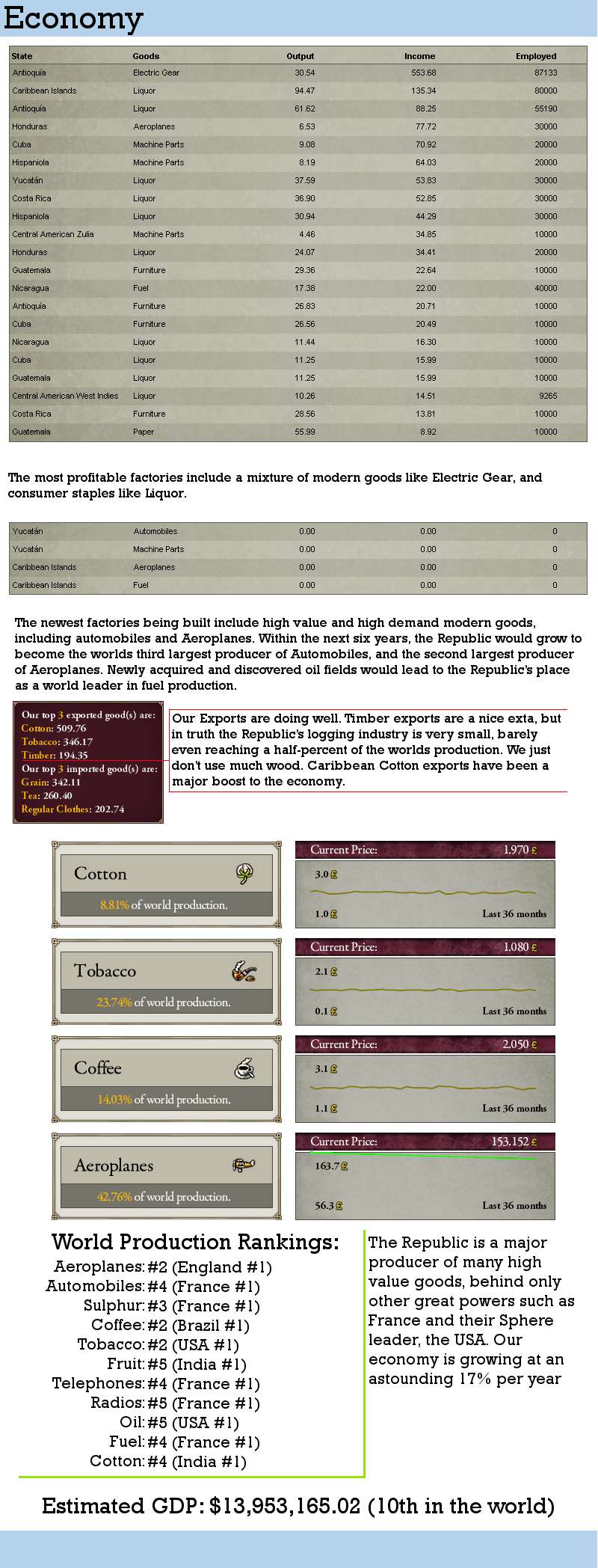
The economic growth the nation experienced under Ponciano Rosales and the Liberals was astounding, more than doubling the nations GDP within a decade. Under Aniceto and the Socialista, it was doubled again within four. Growth went from $12,000,000,000 reals in 1933 to an astounding 24,000,000,000 reals, making the Republic one of the worlds largest and most productive economies. Incomes and household wealth reached new unprecedented heights.
President Aniceto pushed heavily for modern industrial developments, many of which would in turn favour his own personal businesses. Within his first term as president, the Republic would see the textiles industry increase from 2.4% of the worlds production, to 8.8%. Tobacco, a staple of the Republic, would grow to 23.7% of the worlds production. In many major industries, the Republic would grow to be a world leader in supply, exceeding nations that were considered still to be the great powers of the world.
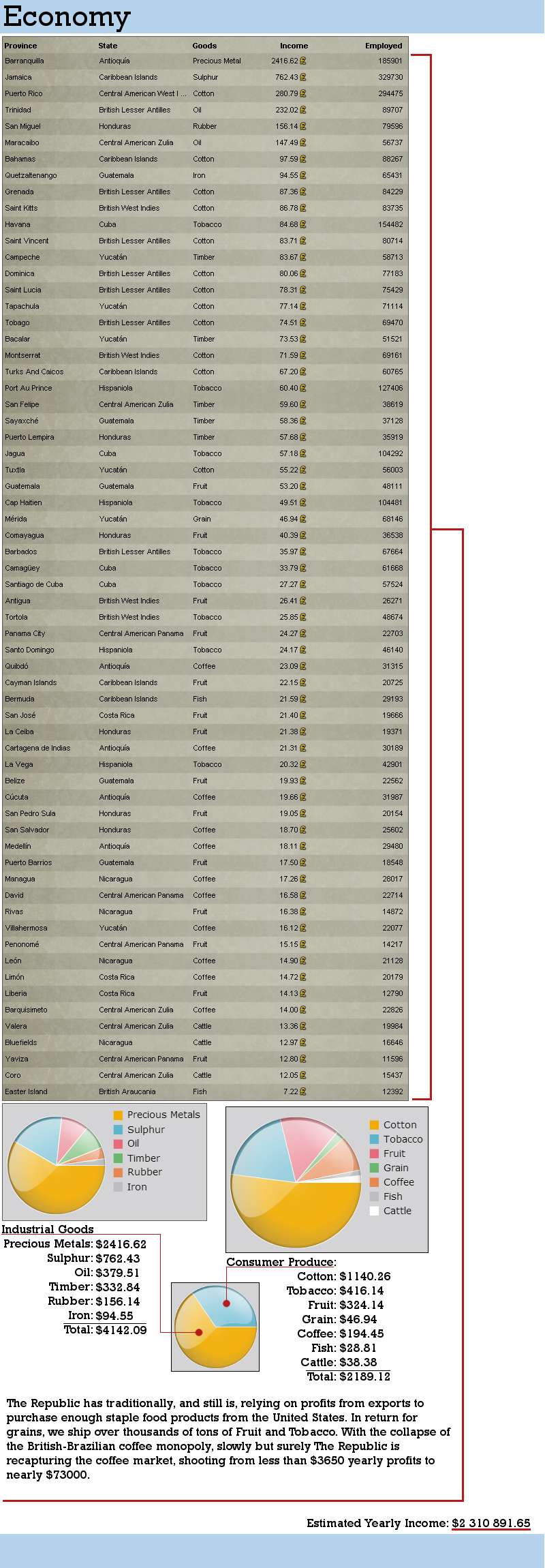
The coffee industry, long since eliminated from the Republic, rebounded after the war. The production of precious metals, sulphur, oil and cotton drove the economy of the nation to heights never before seen under any government, and Aniceto reaped the rewards.
By the time the next election campaigns began in 1934, the Socialista had achieved overwhelming support. During his first term in office, President Aniceto had injected millions into social programs and thrust the nations economy to its greatest heights. Crime in the major centres was all but abolished, kept under the watchful eyes of the Policía Nacional Republicano. Military wages were increased, educational funding was expanded, with public and private schools brought to meet and exceed the standards of the worlds great powers.
The Liberal and Conservador, the only real threats to Socialista power, followed along the same lines as the election campaigns of 1930, questioning Aniceto's public facade of a just man of the people. Many running deputies publicly claimed the Policía Nacional Republicano were little more than a personal military Aniceto was using to silence his opposition.
Making their arguments seem all but invalid, many other deputies, especially Liberal and Conservador, were investigated and found guilty on charges of corruption or found to be embezzling government funds to support underground anti-government terrorist groups. Evidence of these horrible crimes was leaked to the media by informants within the police forces, with Aniceto's newspapers eager to document and publish the damning proof.
These same newspapers had been running campaigns profiling the corruption of the Nacionalista, Liberal and Conservador senators since 1931. Full expose's on high profile senators abusing public funds to finance mansions, yachts, and other forms of extravagance were often shown next to articles praising President Aniceto's recent charitable donations to orphanages, churches, and his many social causes. The full depth of the United Fruit Company's campaigns into buying the Conservador senate was detailed, causing shock and horror among the voters. Some newspapers went so far as to run articles exposing secret conspiracies by angry Senators to assassinate the beloved President, with unnamed whistleblowers coming from congress itself.
Public perception of the Liberal's and Conservadors, in particular their senators, was at an all time low, with many Centroamericano's questioning the continued need for such a corrupt branch of the government. While campaigning, Aniceto was careful with his words, chastising the continued barrage of evidence the police were discovering on the widespread corruption, while stating with equal ferverence how necessary the Senate was to democracy. As the people cried out that the Senate was the last decadent remnant of the Republics dark, dictatorial past, Aniceto would claim that while a Unicameral government of deputies would allow the government to run cheaply and efficiently, the Senate was still needed as a third voice in government. His only concern was the interests of the people.
President Aniceto's election win in 1935 brought with it another decisive majority, and a clear mandate. During the election campaign, votes for deputies poured in, with people waving banners bearing President Aniceto's portrait. Ballots for Senators were left empty, their polling stations met only with protest marches. Many protestors claimed they would refuse to vote for a senate, believing only the deputies, and Aniceto, had the voice of the people. The senate was the source of government corruption and inefficiency, and needs to be removed.
During the first sitting of the spring sessions of Congress, and the first day of President Aniceto's second term, he approached the podium under the deafening roar of applause from the nearly one hundred and sixty Socialista deputies elected in the latest campaign. The senate took their seats on the other side of congress to the deafening roar of boo's. The speaker for the senate, who for over a hundred years had the honour of announcing the opening of congressional sittings, sunk into the overstuffed leather chair, a stack of legislative papers scattered haphazardly across the table in front of him. He grudgingly called the session to order. Before he could review the exhausting stack of papers on his table, the arguments began. "The people have spoken" the deputies would cry, "Reform!" The Senators who bothered to argue back cried aloud about political smear campaigns, injustice, and a breach of democracy. "referendum!" they cried. "Let the true will of the people speak!".
The session would continue with each side arguing for their position, and the President between them working his political doublespeak into overdrive. He agreed with every Senators argument, saying a referendum was necessary, and promising the senate the national police would be at their disposal to investigate any and all claims of conspiracy. In the same breath, he would agree with his Deputies, claiming that the deputyship had always been the true democratic institution within the Republic, and the real voice of the people.
As the Deputies and Senators argued back and forth, President Aniceto thought to himself this was a pointless argument either way. Under the law, As President he had the power to call for referendum against the Senate, but did not have the power to abolish the senate. He could declare a constitutional emergency and have the senate suspended, but no President had done that since Rafael Carrera.
Aniceto took control of the Congress with a loud yell and a call for quiet. He stood at his podium in the centre of the Chambers of Congress; the same spot where speeches from so many great men before him were made.
"I stand before you, not as a leader of men, but as a servant." he emphasized the word servant. "The people do not elect a president, hoping he will fulfill his own will. They elect a President, assured that he has only their will in mind."
The Senators, particularly the speaker, began to grumble.
"You're a tyrant, Aniceto!" the speaker proclaimed, "You've used the people of the Republic to further your own selfish interests!"
"Ridiculous!" Aniceto retorted, "During the war, I supported our president and our people, while the Senate stayed home, safe in their homes, using their influence and wealth to protected themselves and their children from the front lines. While you looked after your own interests, I invested in our nation. I walked the streets, prowled by criminals and miscreants, giving from my own pockets to give my people a better future!"
Aniceto took a breath to calm himself. "The extent of corruption in this nation is a horrible disease. Benito Mejia, Juan Arbenz, and even Rafael Carrera warned the people time and time again to stay ever vigilant against this sickness. Yet the elected leaders, the very people who promised to protect the freedoms for all men, instead used their power to protect only themselves. Heroes, like Benito Mejia and Toribio Zeledon were forced out of these sacred halls for standing up against corruption, and standing up for the people."
The name of Zeledon brought Cheers from the few Comunista present.
"Zeledon was little more than a terrorist and a criminal." The speaker yelled back, "You sully these so called sacred halls by even mentioning his cursed name here."
"Terrorist perhaps, but Zeledon stood for something! That something was the common man, and the common woman. He gave his life to give others a future free from the darkness. Zeledon and Sebastian Teran may have come from different political parties, but they put politics aside for a greater cause. They were both a candle in the darkest moment of the Republics history, and the corruption of the joined Senators here today seek only to snuff that candle out, so the people cannot see the money stolen from their own pockets."
The Senators scoffed and boo'ed.
"The revolution for freedom is not over. It didn't end with President Vasconcelos in San Salvador. The war for democracy didn't end with the destruction of Empires in the forests of Russia and the Jungles of Brazil. The war for freedom and democracy is fought here and now, and it's fought against those who claim to be servants of the people out of the left side of their mouths, but deal with brigands out of the right."
"You serve only yourself. You won a rigged election on an unfair field. If anyone questions you, the 'National Police' knock on their doors." The senators clapped, calling out to Aniceto with the words "Tyrant", "Dictator".
Aniceto waited for the outbursts to subside. His demeanor grew stern.
"I have been given a mandate. The will of the people is clear. They too, have seen the truth. Once side of this Congress is stocked by men of the people, chosen by the people, every four years, to represent their will. The other side, offers elections as lip-service, sitting on their thrones, allowing only those among a clique of aristocrats to grace their seats. If that side, a government placed here by a monarch and empowered by a dictator, will not answer a call for reform, than the peoples options are limited. If democracy is a government of the people, and for the people, than who are we to deny the people's will.
The speaker rose to his feet and tossed crumpled papers from his desk. His reddened face matched his anger.
"You're a snake, Aniceto, and your mindless 'Socialista' little more than rats. You don't have the right... the conviction... or the mandate to deny the constitution of del Valle!"
Aniceto rose as tall as he could to meet the outburst from the Speaker of the senate.
"It is with great regret" He spoke harsh and loudly "That I must, with the powers entrusted in me by the people of the Republic, suspend the Senate of the Federal Republic immediately, and with extreme prejudice, until such a time that the poison has been bled from this wound on our democracy, and the institution can be properly re-instituted under an equal mandate by the people of Central America."
The speaker and his fellow Senators yelled loudly over the cheers from the Deputies. Aniceto signaled to an armed guard by the door, and a large contingent of Policía Nacional Republicano marched into Congress. The Senators began to grow quite and the policemen instructed the senate to vacate Congress peacefully.
The speaker slammed his fist into his table, shaking several sheets of loose papers up into the air.
"You will be hanged for your crimes, and burn in hell for your sins, Aniceto! You are not the will of the people! You are not the voice of this nation!"
Aniceto stepped away from the podium in the centre of Congress and stormed furiously towards the Speakers table.
"I AM the will of the people! I AM the heart and soul of this nation!"
Aniceto slammed his fist into the speakers table.
"I am The Republic!"
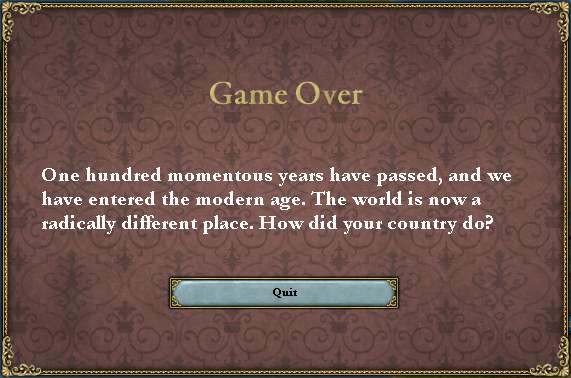

Over the last couple weeks, I wrote and re-wrote this chapter several times. I tried different endings, changed large portions, added bits, removed bits, so on and so forth. I was never happy with how it turned out. In the end, I realized I'd never be happy with how it turned out. Not so much because it needed to be a good ending, or really required some great triumph to feel "complete", but because, in a way, I kind of didn't want it to just end. Realizing that I'd hate anything that I wrote, I figured rather than wasting any more time, I'd just clean up what I had, spell check, and post the damned thing up for all three of my readers to enjoy!
I had a lot of fun writing the story of The Republic, and I hope everyone who read it enjoyed it equally. It was fun, it was hard, and it I'm definitely glad I did. Thanks again to everyone who read, commented, encouraged, and helped me out!
By the end of the game, which I finished a while ago now, The Republic never once made it to Great Power status. We came really, really close though!
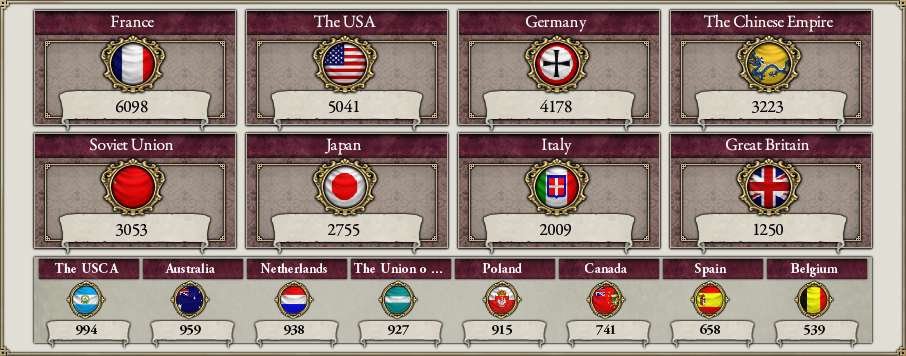
Central America starts at the bottom of the pile of modernised countries, but from these humble beginnings we grew from dead last to ninth place. Not too bad. Is it possible to do better? Yeah, it really is. For the sake of this AAR, I wanted to play with a certain feeling of plausibility and realism. If you toss all that out the window you can quite easily hit the top of the Great Power charts by the end of the game. Mexico is a pushover, and South America is begging to be conquered. Add that to all the delicious resources in Africa, and you can dominate the America's, and the world.
But for our story of the Republic, we kept conquests relatively tame... nevertheless, quite successful.
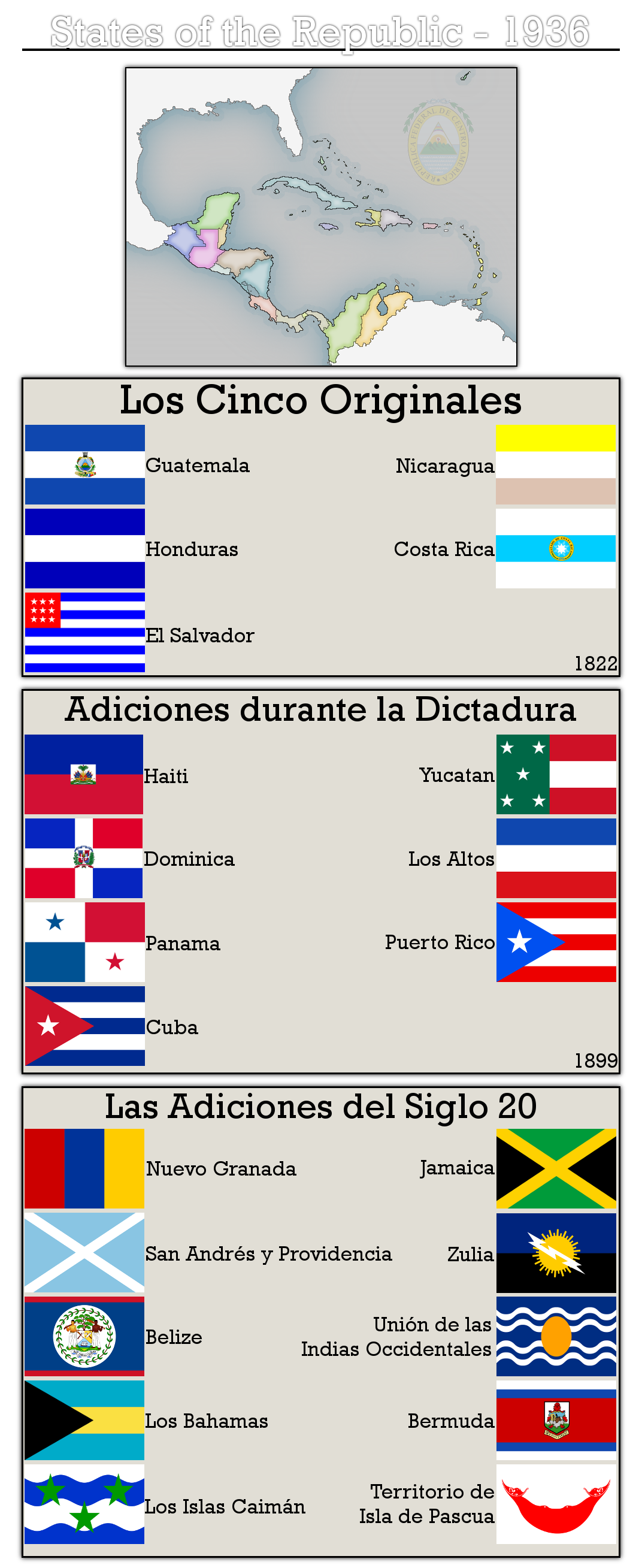
A lot changed from 1836 to 1936. What better way to show off just how much by a brief history of the AAR, in glorious chart form!


And the ending of an AAR just wouldn't feel complete with a final map of the state of the world:
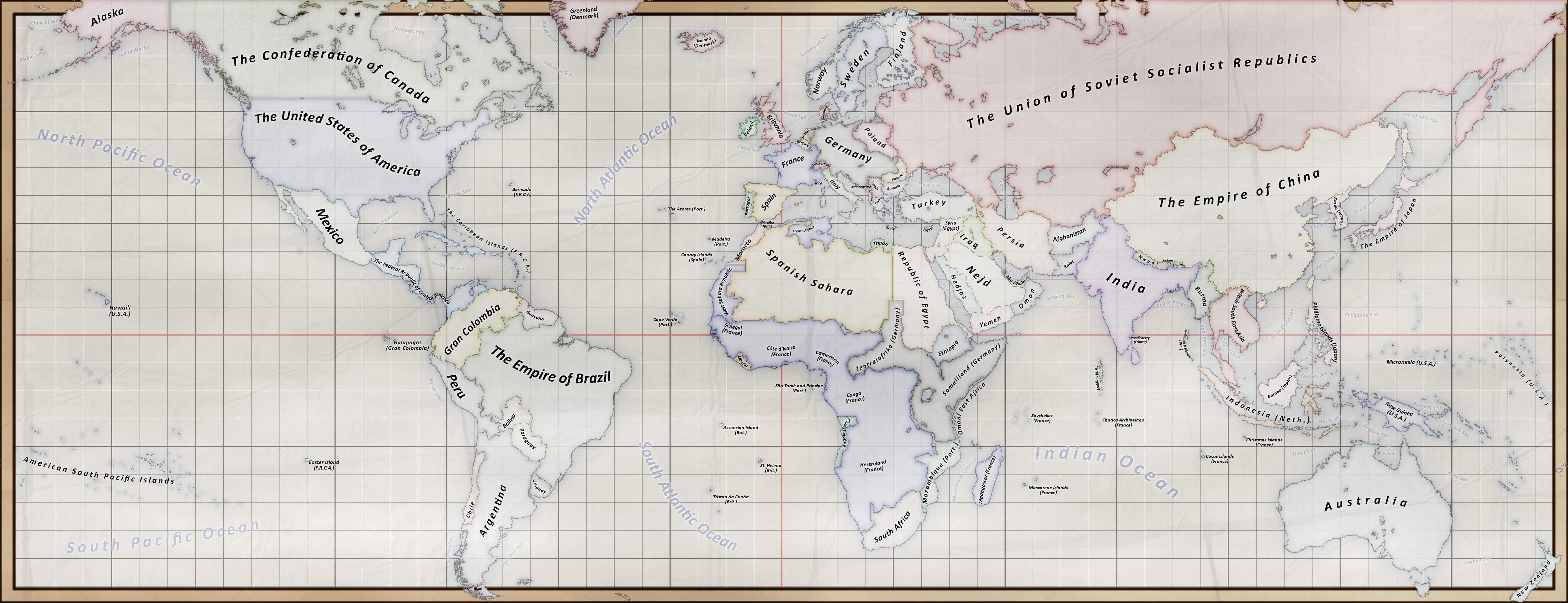
right-click and view image for its full sized goodness!
As you can see from the map, the real winners here would probably be Austria/Germany. An independent Alaska was a first for me, as was a moderately successful revolter state Gran Colombia. The Free Republic of Guayana was something I didn't write about in the last chapter of the AAR, but was entirely my doing. More out of boredom with the lack of events happening in the last six years, combined with my irrational desire to see a united and free Guayana.
Poland is pretty powerful. If it wasn't sandwiched between Germany and the Soviets, it might stand a chance. In all likelyhood, if I were to port this game into HoI3, poor Poland would get obliterated.
The biggest let-down was independent India. I loved seeing them break away from Great Britain at first, and had really high hopes for them, but they quickly fell into the revolution and counter-revolution death-spiral, and never really amounted to anything. By the end of the game, they had a very weak industry and no military. A shame, really. It's worth mentioning though that India did wind up in Japan's sphere of influence pretty quickly, which could have played a factor. Japan was pretty awesome though. Usually in my games they do nothing, but grabbing Korea from Russia, the Philippines from Spain, and Borneo from an uncivilized Brunei and an independent 'Democratic Republic of Borneo' was pretty cool to see.
Once again, thank you to everyone who took the time to read my first ever AAR! I hope you enjoyed reading it as much as I enjoyed writing it!
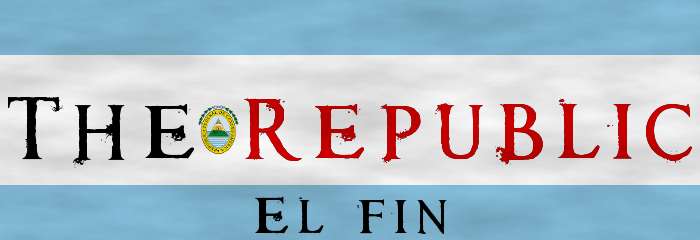
Last edited:
Might I be the first to offer my sincere congratulations to you for finishing what has been a fantastic AAR.
A very intriguing note in which to leave proceedings, for sure. I don't suppose some sort of epilogue would be feasible? You can't end for the final time with such a cliffhanger!
A very intriguing note in which to leave proceedings, for sure. I don't suppose some sort of epilogue would be feasible? You can't end for the final time with such a cliffhanger!
I'm very impressed with the wrapup story, the worldmap, and basically everything about this AAR. I've followed it with great enthusiasm, and you have been a wonderful writer. Congratulations!
It's sad to see this AAR end, but you have done an awesome job with writing and presenting it! Well done, and a very nice end to the story too. 
Bravo! Excellent round up and finale. Although the ending is ambiguous its nice to see someone bully the Senate back before its all over!
Last edited:
Congratulations on finishing this AAR! It's been a long ride, but entirely worth it.

